Hotel industry: key growth points
Hotel industry trends, modern approaches to hotel management, sales strategies and other important aspects of the industry were discussed during the
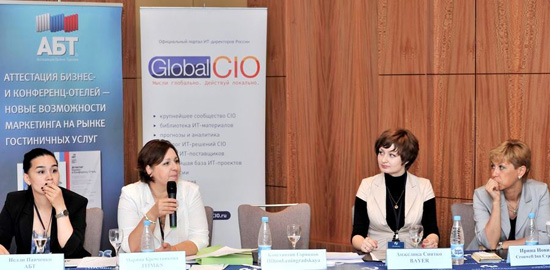
The program included three sections: «Quality mark in the hotel industry», «Sales strategy during international sports events. Life before and after», «Efficient marketing instruments as the guarantee of successful sales».
After the greeting word of conference moderator, administrative director of Japan Tobacco International (JTI) Marina Krechetnikova, Konstantin Goryainov, general manager of Hilton Leningradskaya presented his review of Moscow hotel market.
According to statistics of the Committee on Tourism and Hotel Business of Moscow at present Moscow offers about 48 thousand rooms, 30% of which are run by foreign hotel operators. And this is not the limit — Moscow can cross the 50% threshold in the next ten years.
"«About 3500 rooms were opened under foreign brands from 1991 to 2005, — Mr Goryainov provided his figures. — And from 2005 to 2013 another 11470 similar rooms were put into operation. As we can see, hotel capacity is growing, and consequently we can expect an increase in the number of tourists».
According to the expert, the hotel industry development is hindered by visa barriers and by hotel rates dependence on oil prices: «Strange as it may seem, as soon as the price of oil barrel rises, operators usually raise room rates».
As for the fastest growing hotel market, according to the survey of Pricewaterhouse Coopers (PwC) consulting company, it is Istanbul. Turkey’s main cultural and industrial city offers much more hotels and brands than Moscow, and their occupancy rate amounts to almost 100%.
The most enjoyable part of the first section of the conference was awarding: on behalf of the Russian Association of Business Travel its executive director Julia Kutina presented the speaker with the certificate proving that Hilton Leningradskaya meets standards of a business hotel.
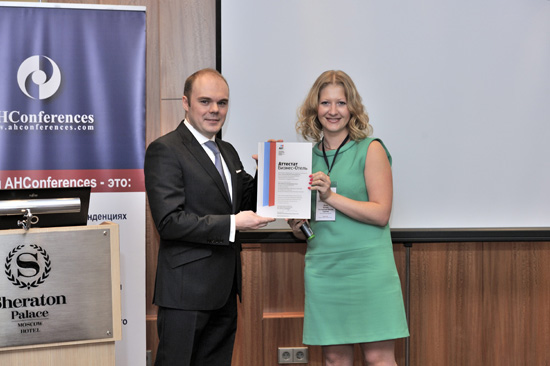
«We will be really glad to recommend the hotel to corporate buyers» — Ms Kutina congratulated general manager of Hilton Leningradskaya.
Then Angelika Snitko, congress manager in Bayer shared her experience in choosing a hotel for corporate events. As she explained, usually the hotel and the corporate buyer have different opinions about what facilities are necessary for a corporate event.
«I have just recently found out that a hall of 500 square meters was booked for a corporate event for 13 persons. I wonder what the manager who made this offer was guided by, — Ms Snitko said. — Believe me, a travel manager does not always have time or effort to check what hall the hotel offers a certain group. But here you have to take into consideration all aspects of the meeting and business area.»
Besides, as Ms Snitko mentioned, VAT value is often omitted in offers: «We spend a lot of time and effort to check important details like that. If hotels had a special form of a commercial offer, we could avoid unnecessary questions and misunderstanding.»
Vadim Prasov, managing partner of MC «Alliance Hotel Management», vice president of the Federation of Restaurators and Hoteliers of Russia spoke about modern approaches in business hotel management.
«I have always called for judging by economic indices, everything else can be omitted. You should make a calculation first of all. Because if you do not do that, the whole process will be a useless waste of time and money and can lead to business decline» — Mr Prasov stressed.
According to the speaker, another important circumstance that is to be taken into consideration by investors when starting a hotel project, is the launch period, when business is not profitable yet.
«The first two or three months, when all hotel activities need to be financed, usually irritate investors, although this situation is normal. And you should be ready for a situation like that» — Mr. Prasov warned.
The topic of hotel classification and attestation was raised in the report of the Head of the ABT Hotel Certification Department, Nelly Panchenko.

«The main aim of the Association is to facilitate professional development of market participants, — Ms Panchenko started her speech. — It’s no secret that the notion of business travel is rather vague and our aim is to work out some methodology, some educational environment that could help specialists get their direction in this industry».
Activities of the Association include educational sessions that are held four times a year. Current problems are discussed with the participation of business travel market representatives and corporate buyers in the first turn.
«Corporations very often have to deal with some kind of a roulette when choosing accommodation, and information about the hotel that you can find on its site or in its prospect does not reflect reality, — Ms Panchenko notes. — That’s why the Association has worked out its Business and Conference Hotel Attestation Program».
The problem is that the hotel industry nowadays lacks one single unified system of hotel attestation. In Russia the system of accommodation means rating is supposed to fulfill these functions, but it is focused on an average tourist’s needs.
«We are not speaking about any type of competition, Ms Panchenko stressed, — we are speaking about cooperation. The goals of attestation and classification are similar to some extent, but in case of attestation the point at issue is whether a certain accommodation facility meets business travellers` demands and to what extent».
The survey of 100 corporate buyers has shown that the choice of a hotel is based first of all on the location and service level of the accommodation facility. Accommodation rates are not considered in the first place. The survey results have been taken into consideration when working out the program.
The attestation will cost 30 000 roubles to business hotels and 45000 roubles to conference hotels. The hotels that have already passed state classification, are offered a 50% discount off the price of inspection. The certificate is valid for 3 years.
Cronwell Inn Stremyannaya in Saint Petersburg has been successfully certified by ABT as a business hotel. Irina Novikova, Head of hospitality department in Cronwell Inn Stremyannaya told conference participants that it was also the first eco-hotel in Russia. In 2010 the hotel was awarded Green Key Certificate that is indicative of the hotel’s ecological policy.
«It’s no secret that ecological culture is starting to be part of our life. And the hotel industry does not stay away from these processes. Eco-hotels are present in many countries, and many accommodation facilities compete to be granted the name of „the greenest“ hotel, — Ms Novikova said. — In case of Cronwell Inn Stremyannaya it includes energy saving technologies, individual heating and conditioning, efficient frost protection of walls, local food products and many other things».
Besides, smoking is not allowed in hotel rooms, there is a special room for this purpose. Another characteristic is waste sorting into different groups.
The first section of the conference named «Quality mark in the hotel industry» was completed by general director of «Avantel Club Istra» hotel, Maria Averkina, who spoke about optional services.
Supplementary services in country hotels include catering services (restaurants, banquets, bars, tea-houses), business services (leasing of halls and equipment for various events), sports (parachute jumping, ballooning, etc.), health related services (swimming pools, SPA, baths and other) and other services including entertainment shows, animation and kids clubs).
«You should not be satisfied with what your hotel already has to offer or with what your competitors offer, -Ms Averkina noticed. — I wish you to be in a constant search of new unusual ideas that provide your hotel’s competitive advantage, its positive perception by its customers and guarantee its leading positions on the market».
After her report Ms Averkina was granted ABT`s certificate proving that «Avantel Club Istra» hotel meets standards of a business and conference hotel.
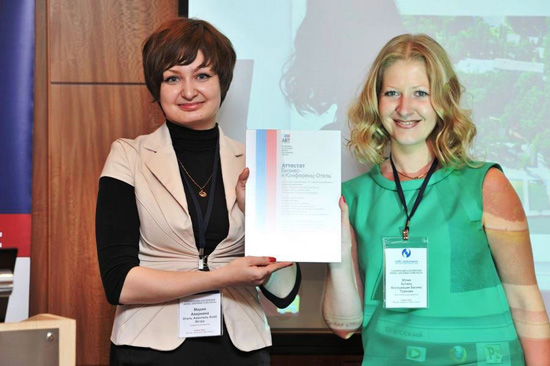
The second section of the conference named «Sales strategy during international sport events. Life before and after» was opened by Polina Frolova, sales director in IFK Hotel Management and regional commercial director of international hotel operator Golden Tulip Hotels Suites and Resorts. The dwelled upon a very crucial issue — Sochi`s preparedness for Olympic Games 2014.
The city’s hotel facilities are undergoing profound changes nowadays. In January 2013 in Sochi mountain area a new 3 star hotel was opened, Tulip Inn Rosa Khutor, that offers 148 rooms. This autumn another two hotels are to open: Golden Tulip Rosa Khutor, a 4 star hotel, and Tulip Inn Omega Sochi, a 3 star hotel. Besides, at the end of the year «Sochi Park Hotel» offering 278 rooms is to be put into operation.
«We should definitely think about what awaits all accommodation facilities after the Olympics, — Ms Frolova pointed out. — Obviously, there are too many hotels. Besides, not only Sochi`s market infrastructure, but the guest contingent is going to change. Corporate travel market will probably grow».
The way out of the possible difficult situation is seen in cooperation of all market participants on the federal and regional levels, including preservation of service standards and Sochi promotion on the world arena.
Specific activities of a travel agency providing big sport events were addressed by Lana Klyueva, senior operations manager in BYROM plc — an official accommodation partner of World FIFA 2018™ Championship in Russia.
«If we speak about Federation of International Football Associations (FIFA), its main aim is to provide good accommodation facilities for its fans. BYROM plc, an official accommodation agency for FIFA Confederations Cup 2017 and the World FIFA 2018™ Championship in Russia is engaged in hotel market analysis and classification, concluding contracts and purchases, sales and financial supervision, — Ms Klyueva said. — And here we need to remember FIFA`s slogan — „For the Game. For the world“: all players benefit only in case they do it together. In particular, the point at issue is that hotel rates should not be overpriced. I still remember a situation we had with a hotel in Kiev, where a standard room cost an exorbitant 170 thousand roubles!»
The third section «Efficient marketing instruments as the guarantee of successful sales» was opened by Pavel Sakharov, commercial director of Moscow region country hotel «Tzargrad». The speaker dwelled on the issue of sales and marketing policy in country hotels. From his point of view, in order for the work and sales to be efficient, the hotel should think about its service level. It is very useful to find your own «zest». «We all are very much alike, so for efficient development it is necessary to find your own niche that will be competitive and thus profitable».
The problem of relations between the hotel and the customer using experience of «Caspersky Lab» that has up to 2000 business trips per year, was raised by Irina Kostyukova, head of business travel.
The main theme of her report could be expressed in Microsoft founder and director, Bill Gates`s words: «Our most picky clients are our best teachers». In her presentation Ms Kostyukova raised problems and hot issues that travel managers have to deal with every day. For example, when the hotel tries to sell rooms of a higher category saying that standard rooms are unavailable, when rack rates are lower than the corporate tariff that has been confirmed or when the hotel goes on offering last year tariffs for direct enquiries, although the agreement has expired and the new tender has not been won.
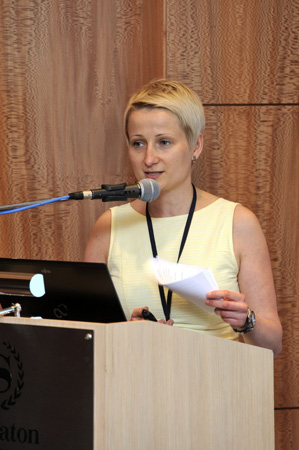
The correlation of reputation, quality and sales in the hotel industry was explained by Andrey Mikhalets, the commercial director of «Astrus — the Central House of Tourist».
«There are about seven main instruments how to establish feedback with clients, including: reviews on the hotel’s site, public reviews on online booking sites, questionnaires and forms, hot lines, — Mr Mikhalets said. — We received about 2000 reviews using these instruments, which allowed us to find out our main problem areas and then to eliminate them. So I advise hoteliers to use the above mentioned instruments and to take decisions in due time».
Presents from the «Tzargrad» hotel were raffled off between the participants and the speakers at the end of the conference.
The conference ended with a panel discussion where the industry participants were unanimous regarding the importance of the meeting and identified once again the main growth points of the hotel industry. The main attention was paid to Moscow region country hotels that can hardly survive separately. They lose out to Moscow hotels due to their worse transport accessibility and lose lots of corporate groups as the result. So it is important to use all possibilities Ms Averkina spoke about at the conference.
The useful dialogue and precious business contacts were celebrated by the conference participants with a glass of champagne.
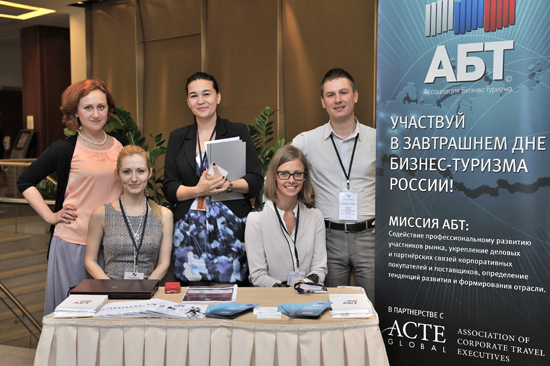
|
Marina Osipova |